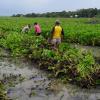Image: Cristobal Coc, indigenous Q'eqchi farmer and part of a World Renew programme in Guatemala, stands in a corn field in Concepción Actelá, Alta Verapaz. Drought linked toclimate change has severely affected the crops in this area over the last seven years.
As my family and I traveled around southeastern Ontario this summer, we couldn’t help notice how dry and stunted fields and crops looked. The story of extreme weather was the same for other parts of Canada and USA, with coastal British Columbia experiencing abnormally dry weather; farmers in Nova Scotia dealing with the driest conditions in 70 years; Louisiana, West Virginia and Texas seeing the worst floods in their history; and huge wildfires in Alberta and California.
The story is the same around the world. At one extreme, the Philippines is becoming increasingly susceptible to drought, while also becoming more vulnerable to being pulverized by heavy monsoon rainfalls. Exacerbated by high levels of land degradation and deforestation, Hondurans face significant climate change-driven water scarcity challenges in the near future (Trócaire, 2015). Rural-urban migration in Kenya is heightened during periods of drought and conflicts are fueled by declining pasture and water resources (Trócaire, 2015). A slow-moving disaster has reached the precipice in Southern Africa—El Niño and now La Niña weather patterns have completely devastated crops, leaving people who were already poor now in a desperate situation.
As an international development practitioner with World Renew, I work with staff who live in countries that are impacted by these extreme weather events. Time and time again I hear that it is climate change that is causing their communities many hardships.
No longer can subsistence farmers rely on the traditional weather patterns and rainfall seasons, and gone are the days when people can say that the impacts in one country does not affect them.
I care about climate change because it would be unjust to ignore the impacts it is already having on some of the most vulnerable populations in the world, especially on communities and individuals who have contributed very little to the increases in greenhouse gases and carbon emissions. I also care about climate change because it reveals to us how connected we are to one another and how together we can respond to adapt and even mitigate its impacts.
I have the opportunity to work on some really innovative programs that are managing to transform severely degraded Sahel lands into productive farmland. Other programs work on increasing the agricultural production and productivity of small-scale farmers, especially women, using environmentally sustainable farming and post-harvest management practices.
Having the privilege to work on these programs and hearing the stories of how the lives of families have been transformed gives me hope. It gives me hope that climate change is not a future that we are doomed with. The impacts of climate change can be reversed and the small daily decisions and advocacy choices I make can make a difference in changing the story. Will I make the right decisions for my children and the future to come?
Psalm 27:4-5 One thing have I asked of the LORD, that will I seek after: that I may dwell in the house of the LORD all the days of my life, to gaze upon the beauty of the LORD and to inquire in his temple. For he will hide me in his shelter in the day of trouble; he will conceal me under the cover of his tent; he will lift me high upon a rock.
Welcome to our Why I Care about Climate Change series! This series is for you, for the voices that don't shout the loudest, but have important things to say about climate change. Check back on Monday to hear a young person's perspective. Or subscribe here to our weekly email digest to make sure you don't miss a post!

Trócaire, (2015). Feeling the Heat: How climate change is driving extreme weather in the developing world (Online). https://www.trocaire.org/resources/policyandadvocacy/feeling-the-heat
[Image: Sean Hawkey 2016, from World Renew media library]






The Reformed family is a diverse family with a diverse range of opinions. Not all perspectives expressed on the blog represent the official positions of the Christian Reformed Church. Learn more about this blog, Reformed doctrines, and our diversity policy on our About page.
In order to steward ministry shares well, commenting isn’t available on Do Justice itself because we engage with comments and dialogue in other spaces. To comment on this post, please visit the Christian Reformed Centre for Public Dialogue’s Facebook page (for Canada-specific articles) or the Office of Social Justice’s Facebook page. Alternatively, please email us. We want to hear from you!
Read more about our comment policy.